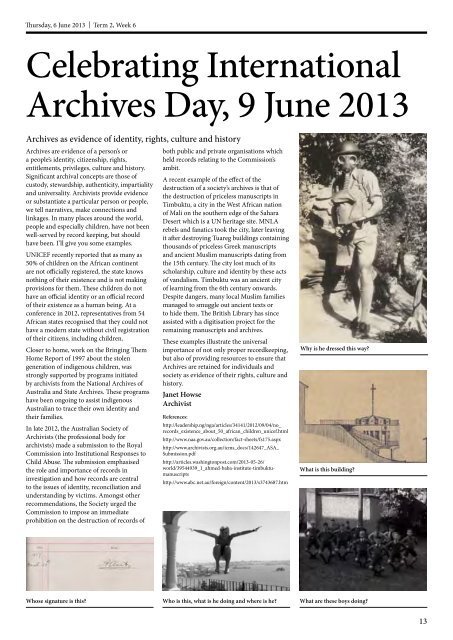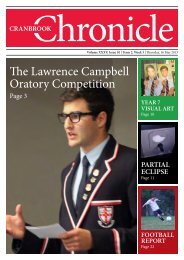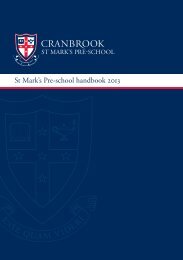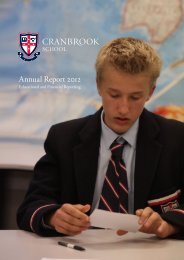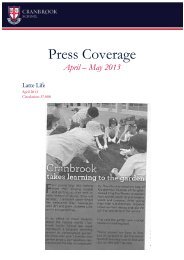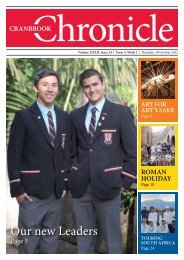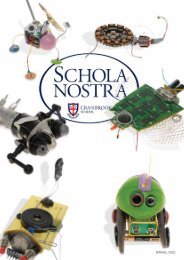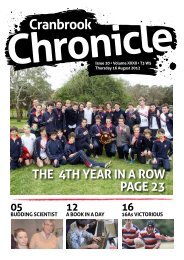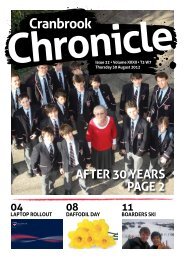You also want an ePaper? Increase the reach of your titles
YUMPU automatically turns print PDFs into web optimized ePapers that Google loves.
Thursday, 6 June 2013 | Term 2, Week 6Celebrating InternationalArchives Day, 9 June 2013Archives as evidence of identity, rights, culture and historyArchives are evidence of a person’s ora people’s identity, citizenship, rights,entitlements, privileges, culture and history.Significant archival concepts are those ofcustody, stewardship, authenticity, impartialityand universality. Archivists provide evidenceor substantiate a particular person or people,we tell narratives, make connections andlinkages. In many places around the world,people and especially children, have not beenwell-served by record keeping, but shouldhave been. I’ll give you some examples.UNICEF recently reported that as many as50% of children on the African continentare not officially registered, the state knowsnothing of their existence and is not makingprovisions for them. <strong>The</strong>se children do nothave an official identity or an official recordof their existence as a human being. At aconference in 2012, representatives from 54African states recognised that they could nothave a modern state without civil registrationof their citizens, including children.Closer to home, work on the Bringing <strong>The</strong>mHome Report of 1997 about the stolengeneration of indigenous children, wasstrongly supported by programs initiatedby archivists from the National Archives ofAustralia and State Archives. <strong>The</strong>se programshave been ongoing to assist indigenousAustralian to trace their own identity andtheir families.In late 2012, the Australian Society ofArchivists (the professional body forarchivists) made a submission to the RoyalCommission into Institutional Responses toChild Abuse. <strong>The</strong> submission emphasisedthe role and importance of records ininvestigation and how records are centralto the issues of identity, reconciliation andunderstanding by victims. Amongst otherrecommendations, the Society urged theCommission to impose an immediateprohibition on the destruction of records ofboth public and private organisations whichheld records relating to the Commission’sambit.A recent example of the effect of thedestruction of a society’s archives is that ofthe destruction of priceless manuscripts inTimbuktu, a city in the West African nationof Mali on the southern edge of the SaharaDesert which is a UN heritage site. MNLArebels and fanatics took the city, later leavingit after destroying Tuareg buildings containingthousands of priceless Greek manuscriptsand ancient Muslim manuscripts dating fromthe 15th century. <strong>The</strong> city lost much of itsscholarship, culture and identity by these actsof vandalism. Timbuktu was an ancient cityof learning from the 6th century onwards.Despite dangers, many local Muslim familiesmanaged to smuggle out ancient texts orto hide them. <strong>The</strong> British Library has sinceassisted with a digitisation project for theremaining manuscripts and archives.<strong>The</strong>se examples illustrate the universalimportance of not only proper recordkeeping,but also of providing resources to ensure thatArchives are retained for individuals andsociety as evidence of their rights, culture andhistory.Janet HowseArchivistReferences:http://leadership.ng/nga/articles/34141/2012/09/04/no_records_existence_about_50_african_children_unicef.htmlhttp://www.naa.gov.au/collection/fact-sheets/fs175.aspxhttp://www.archivists.org.au/icms_docs/142647_ASA_Submission.pdfhttp://articles.washingtonpost.com/2013-05-26/world/39544939_1_ahmed-baba-institute-timbuktumanuscriptshttp://www.abc.net.au/foreign/content/2013/s3743687.htmWhy is he dressed this way?What is this building?Whose signature is this? Who is this, what is he doing and where is he? What are these boys doing?13


